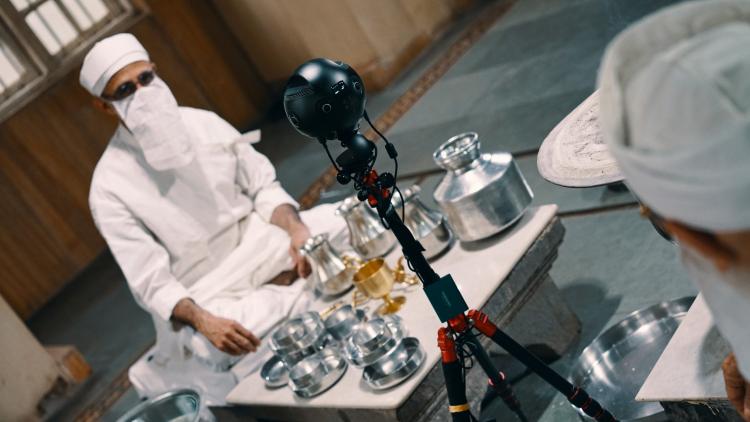Muslim Britain: Perspectives and Realities (15Cr)

Key information
- Start date
- End date
- Year of study
- Any
- Duration
- Term 1
- Module code
- 15PSRH061
- FHEQ Level
- 7
- Credits
- 15
- Department
- Department of Religions and Philosophies
Module overview
The course begins by establishing the religion in a historical context starting with early Muslim migrations and settlement in Britain in the 19th century, through the various phases of subsequent migrations, to the institutionalising of Islam in Britain in the early twentieth century and the emergence of community leaders. Within this framework it will cover the different ethnic, sectarian and doctrinal approaches to Islam belonging to and/or adopted by migrants and second and third generation Muslims. The second part of the course will focus on particular issues that have arisen, uniquely, out of the above context and in response to world events. Students will be asked to differentiate between ‘perceptions of Islam’ as portrayed in historical accounts, media coverage, popular culture, and oral testimony, and ‘realities’ of Islam which include the ways in which government, at national and local level, have provided for the particular needs of the various Muslim communities with respect to the law, employment, education and health, gender issues, religion, and the role of Islamic institutions. Areas of debate will include such issues as the extent to which ‘Islam’ can be separated from Muslim society; the ways in which British Muslim identities are replacing ethnic ties amongst second and third generation Muslims; the role of Arabic in religious worship amongst the predominantly non-Arab British Muslim population.
Objectives and learning outcomes of the module
On successful completion of this module a student will be able to:
- Explain the historical context of Islam in Britain
- Differentiate between ethnic, sectarian and doctrinal approaches to Islam in Britain.
- Critically evaluate the different theoretical and disciplinary approaches to the subject: religious, historical, political, sociological.
- Critically assess how oral testimony contributes to the study of Islam in Britain
- Compose well-evidenced arguments about what it means to be British Muslim at the turn of the century
Workload
1 hour lecture and 1 hour tutorial each week for 10 weeks.
Scope and syllabus
- Early history from the introduction of Arabic learning to England in the 10th century through the Elizabethan and Victorian periods. Perceptions of Islam in literature.
- Institutionalising Islam in the early 20th century and the emergence of Muslim leaders
- Post-1945 migrations to Britain, i. economic and ii. political
- Sectarianism
- Islam and gender in British Muslim communities: patriarchy, modernisation, marriage, polygamy, Islamic dress
- Muslim political representation in Britain
- British Muslims and education
- Reverts to Islam
- The role of the media and popular fiction in shaping public opinion about Islamic culture
- British law and Islamic jurisprudence
- Islamophobia
Method of assessment
- An essay of 1000 words (25%)
- An essay of 2,500 (65%)
- Seminar attendance and contribution (10%)
Suggested reading
- Ansari, Humayun (2000) The ‘infidel’ within: Muslims in Britain since 1800, London: Hurst, (chapter 1) pp. 1-23
- Gilliat-Ray, Sophie (2010) Muslims in Britain: an introduction, Cambridge: CUP
- Matar, Nabil (1997), ‘Muslims in Seventeenth-Century England’, Journal of Islamic Studies, Vol. 8, No. 1, pp. 63-82
- Bennett, Clinton (1992) Victorian Images of Islam, London: Grey Seal
- Lawless, Richard (1995), From Ta’izz to Tyneside: an Arab community in the North-East of England during the early twentieth century, University of Exeter Press, pp. 218-244
- Werbner, Pnina (1996) ‘The Making of Muslim Dissent: Hybridized Discourses, Lay Preachers, and Radical Rhetoric among British Muslims’, American Ethnologist, 23:1, pp. 102-122
- Gilham, Jamie (2014) Loyal Enemies: British Converts to Islam 1850-1950. Oxford: Oxford University Press [Available online on Dawson Era via SOAS Library]
- Hamid, Sadek ed. (2017) Young British Muslims: Between Rhetoric and Realities. Abingdon, Oxon: Routledge [Available online at Dawson Era via SOAS Library]
- Lewis, Philip and Hamid, Sadek (2018) British Muslims: New Directions in Islamic Thought, Creativity and Activism. Edinburgh: Edinburgh University Press. [Available online at Dawson Era via the SOAS Library catalogue]
- Bowen, Innes (2014) Medina in Birmingham, Najaf in Brent: Inside British Islam. London: C. Hurst & Co. (Publishers) Ltd [Available online at Dawson Era via SOAS Library]
Convenor
Disclaimer
Important notice regarding changes to programmes and modules


